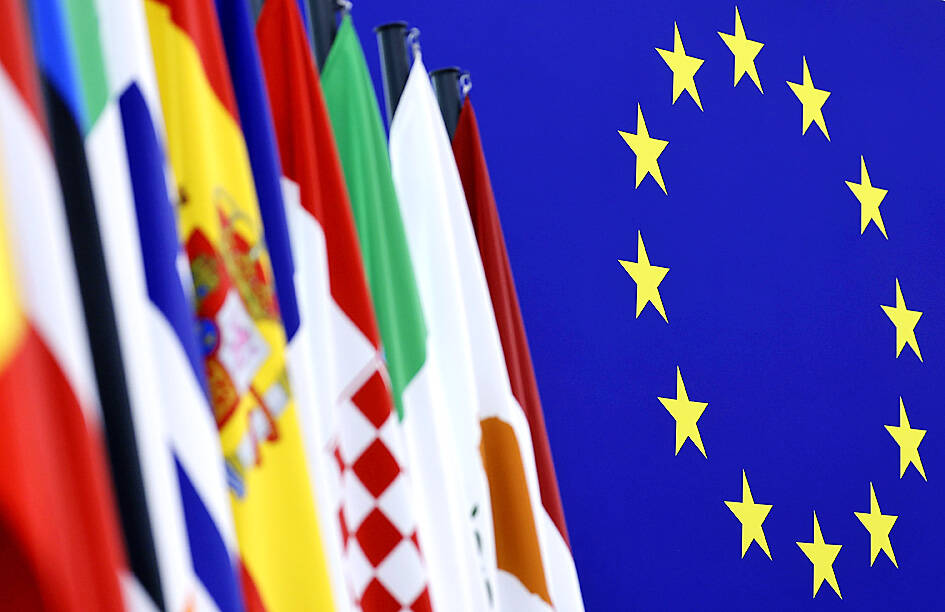The European Union will raise concerns with the US over a decision to restrict the export of artificial intelligence (AI) chips from the likes of Nvidia Corp to some of its member states, according to people familiar with the matter.
In one of its last moves in office, former US president Joe Biden’s administration introduced a three-tier system to curb sales of AI chips used in data centers. The US placed Poland and a number of its allies in the EU’s east in the second-tier category of countries that face limits to the amount of computing power they can purchase.
The goal of the measures, which companies such as Nvidia and Oracle Corp have warned could be catastrophic for the US tech industry, is to ensure that the global development of AI aligns with American standards and relies on US technology.

Photo: Ronald Wittek, EPA-EFE
The rules split the globe into a group of close US allies including western European nations as well as Canada, Japan and the UK, which won’t face serious restrictions. The second category that will involve caps on AI chip imports covers most of the world, while the third group involves adversaries such as China and Russia, which are effectively barred from buying the powerful semiconductors.
The move goes against the EU’s single market by treating member states differently, said the people, who spoke on condition of anonymity to discuss private discussions. It would also hinder innovation in the bloc’s east and unfairly favor western European companies, one of the people said.
Polish Minister of Digital Affairs Krzysztof Gawkowski said the White House’s decision was “incomprehensible and is not based on any substantive reasons.” Foreign ministers from Latvia, Estonia and Lithuania said in a joint statement that it undermines “the development of our national AI eco-systems.”
Although US President Donald Trump made little specific mention of Europe in his inaugural address, he has repeatedly threatened tariffs and the bloc is bracing for the worst.
If attempts to engage with the new US administration on alternatives such as a common approach to China fail, the EU has already prepared lists of goods to target if Trump moves forward with tariffs.

The US dollar was trading at NT$29.7 at 10am today on the Taipei Foreign Exchange, as the New Taiwan dollar gained NT$1.364 from the previous close last week. The NT dollar continued to rise today, after surging 3.07 percent on Friday. After opening at NT$30.91, the NT dollar gained more than NT$1 in just 15 minutes, briefly passing the NT$30 mark. Before the US Department of the Treasury's semi-annual currency report came out, expectations that the NT dollar would keep rising were already building. The NT dollar on Friday closed at NT$31.064, up by NT$0.953 — a 3.07 percent single-day gain. Today,

‘SHORT TERM’: The local currency would likely remain strong in the near term, driven by anticipated US trade pressure, capital inflows and expectations of a US Fed rate cut The US dollar is expected to fall below NT$30 in the near term, as traders anticipate increased pressure from Washington for Taiwan to allow the New Taiwan dollar to appreciate, Cathay United Bank (國泰世華銀行) chief economist Lin Chi-chao (林啟超) said. Following a sharp drop in the greenback against the NT dollar on Friday, Lin told the Central News Agency that the local currency is likely to remain strong in the short term, driven in part by market psychology surrounding anticipated US policy pressure. On Friday, the US dollar fell NT$0.953, or 3.07 percent, closing at NT$31.064 — its lowest level since Jan.

The New Taiwan dollar and Taiwanese stocks surged on signs that trade tensions between the world’s top two economies might start easing and as US tech earnings boosted the outlook of the nation’s semiconductor exports. The NT dollar strengthened as much as 3.8 percent versus the US dollar to 30.815, the biggest intraday gain since January 2011, closing at NT$31.064. The benchmark TAIEX jumped 2.73 percent to outperform the region’s equity gauges. Outlook for global trade improved after China said it is assessing possible trade talks with the US, providing a boost for the nation’s currency and shares. As the NT dollar

The Financial Supervisory Commission (FSC) yesterday met with some of the nation’s largest insurance companies as a skyrocketing New Taiwan dollar piles pressure on their hundreds of billions of dollars in US bond investments. The commission has asked some life insurance firms, among the biggest Asian holders of US debt, to discuss how the rapidly strengthening NT dollar has impacted their operations, people familiar with the matter said. The meeting took place as the NT dollar jumped as much as 5 percent yesterday, its biggest intraday gain in more than three decades. The local currency surged as exporters rushed to